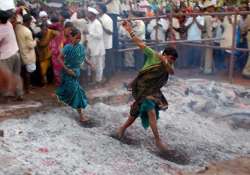Gujarat tribals walk ember to mark Holi festival
Vadodara, Mar 28: For tribals from Dahod and Narmada districts of Gujarat, festival of Holi is the occasion to seek divine intervention for their problems, ranging from ill health to birth of a male child,

Vadodara, Mar 28: For tribals from Dahod and Narmada districts of Gujarat, festival of Holi is the occasion to seek divine intervention for their problems, ranging from ill health to birth of a male child, in lieu of a small test of physical endurance.
Some villagers from these district walk the ember of bonfire on Holi Purnima to make a wish to the goddess for desired boons.
“It is their (tribals) tradition of walking on cinders after lighting up the bonfire on the day of Holi Purnima.
This year villages in Adamla in Narmada district and Raniyara in Dahod district walked the ember for fulfilment of their desires”, said tribal leader and former union minister Naranbhai Rathwa.
The ritual of walking the cinder, practised by tribals is based on the belief that their problems will be cured with the invocation of goddess while enduring the pains.
On Tuesday night, many tribals, with garlands brushing their bare chests, crossed the smoldering wood while singing ode to the deity and seeking Her boon for desires as vivid as protecting their cattle to birth of a male child.
Some villagers from these district walk the ember of bonfire on Holi Purnima to make a wish to the goddess for desired boons.
“It is their (tribals) tradition of walking on cinders after lighting up the bonfire on the day of Holi Purnima.
This year villages in Adamla in Narmada district and Raniyara in Dahod district walked the ember for fulfilment of their desires”, said tribal leader and former union minister Naranbhai Rathwa.
The ritual of walking the cinder, practised by tribals is based on the belief that their problems will be cured with the invocation of goddess while enduring the pains.
On Tuesday night, many tribals, with garlands brushing their bare chests, crossed the smoldering wood while singing ode to the deity and seeking Her boon for desires as vivid as protecting their cattle to birth of a male child.